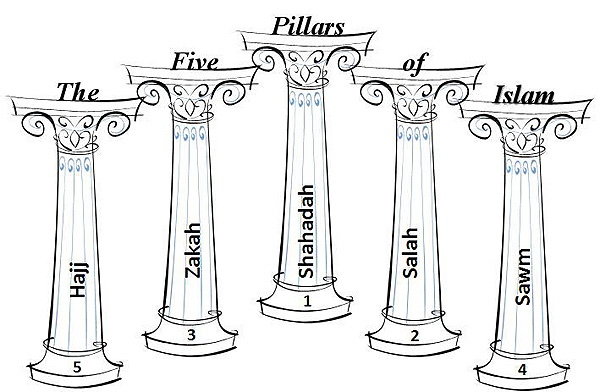The Five Pillars of Islam (arkān-al-Islām أركان الإسلام; also arkān ad-dīn أركان الدين "pillars of the religion") refer to five basic acts of the Islamic religion, considered mandatory by the believers and serve as the foundation of Muslim life. They have not been mentioned in the Quran. They form the basis of Muslim life, prayer, self purification, pilgrimage and concern for the needy.
In Islam, the five pillars of faith are the core practices and beliefs that every Muslim strives to uphold. They form the foundation of Islamic life and are considered obligatory acts of worship.
The pillars are:

The five pillars of Islam are more than just basic duties; they're a comprehensive framework for living a life aligned with Islamic principles. Let's understand the philosophy of each of these pillars:
More than just words, the Shahada encapsulates the core Islamic beliefs: tawhid, the oneness of God, and nubuwwa, the prophethood of Muhammad.
Saying the Shahada publicly is a significant step in conversion to Islam, signifying complete acceptance of its principles.
This declaration shapes every aspect of a Muslim's life, influencing their actions, decisions, and worldview.
Five daily prayers, each with specific postures, recitations, and timings, connect Muslims directly with Allah throughout the day.
These prayers serve as reminders of faith, instill discipline, and provide comfort and guidance.
Performing Salah in congregation strengthens community bonds and fosters a sense of unity.
Zakat is a mandatory annual donation of a specific portion of one's wealth to support the poor, needy, and other deserving causes.
It promotes social justice, encourages compassion, and purifies wealth.
Zakat ensures basic needs are met within the community and cultivates a spirit of generosity and social responsibility.
During the holy month of Ramadan, Muslims abstain from food, drink, and other physical needs from dawn to sunset.
This practice fosters self-discipline, self-reflection, and empathy for the less fortunate.
Muslims who fast experience hunger and thirst, reminding them of their dependence on Allah and the struggles faced by others.
Hajj is a mandatory pilgrimage to Mecca, the holiest city in Islam, at least once in a lifetime for those physically and financially able.
It involves a series of rituals, each with symbolic meaning, culminating in circumambulating the Kaaba, a cubical structure believed to be built by Abraham and Ishmael.
Hajj represents complete submission to Allah, renewal of faith, and unity of the Muslim Ummah (community).
Interconnectedness and Significance:
The five pillars are not isolated practices; they interweave and reinforce each other. Performing Salah motivates gratitude, leading to generosity in Zakat. Fasting fosters empathy, making Zakat even more meaningful. Each pillar contributes to a life characterized by devotion, social responsibility, and self-improvement.
Understanding these pillars provides a deeper insight into the Islamic faith and the values it upholds. They serve as a guiding light for Muslims, fostering both individual and communal well-being in this world and the hereafter.